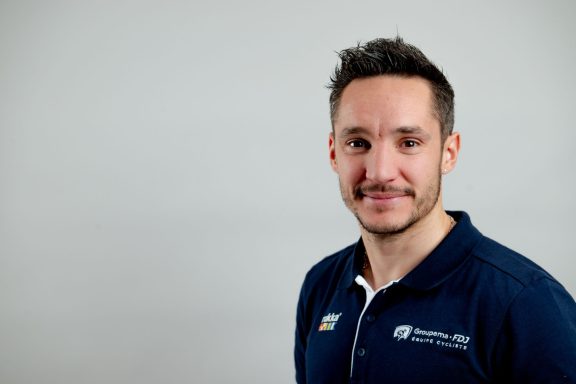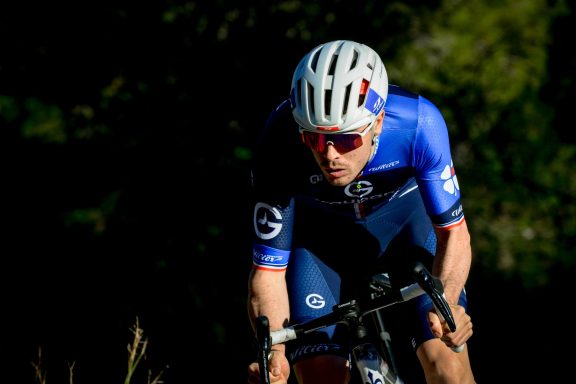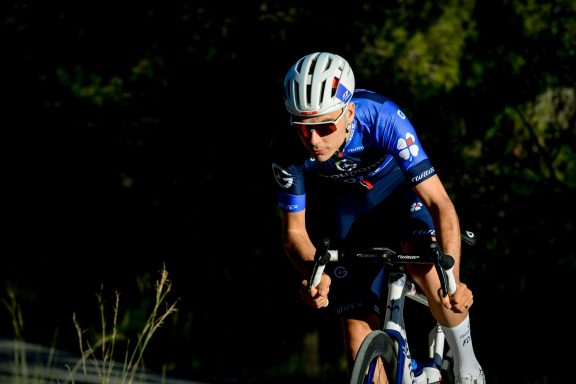After the 2023 assessment of the WorldTour Team and a complete update on the Juniors program, it is now time to look back at the Conti’s last season. A sports director of a whole new group, Jérôme Gannat sat down to analyse this fifth vintage, which he considers satisfying on many aspects, but mostly promising for 2024.
Jérôme, with a clear head, what assessment do you make of the 2023 season of “La Conti”?
Generally speaking, the group improved throughout the season, collectively, but also individually. Many came out of the junior ranks and were discovering the elite/u23/Class 2 level. They all reached a milestone and that’s really the year’s positive point. This means that the training was good, that the coaching was efficient, and that everything we put in place worked out. The primary objective of a continental team like ours is the rider’s development. From this point of view, this season confirmed the trend of past years. Every time a rider joined the Conti, he was stronger the following year.
“The season met our expectations”
How do you assess the season’s results sheet?
It’s hard to avoid comparisons with past years. 2022 was an exceptional season, but the previous season was also very good since we finished third at continental level. On the other hand, it is difficult to compare one year with another, because the group was more than 90% renewed this season for instance. It was also the youngest continental team ever recorded at the UCI: 18.3 average age. The work was for sure more difficult because it was a group that did not have great experience or huge references. It was a 200% training year. We must also be aware that 2022 was exceptional and that it was not possible to do it again. We knew it. The season ultimately met our expectations. I think we placed a little beyond 100th in the UCI rankings (112th). It’s not extraordinary, but when we look a little deeper into our season, there are some good, promising things. We won five times, and we didn’t always reach that total. It’s not as good as in previous years, but it’s not bad either.
During the season, you said the riders needed to adapt. Physically, mentally, as a team?
All three, but I think the physical adaptation was the most important one. Class 2 races have nothing to do with junior races, whether in terms of distance or competition. We were a bit inferior at the start of the season, we suffered in races. We needed this time of adaptation to pass this little physical milestone which then allows us to play a more important role, to be a protagonist in the race. Thibaud [Gruel] adapted very quickly, with a podium straight away then a victory quite early on, but we felt that the group was a little more fragile than in the past. We paid for the lack of physical maturity at the start of the season. In the second half of the season, on the other hand, we were able to be more up there and influence the race.
Was it also harder to “build” a whole new group?
It actually often is. Every year, we have to rebuild, recreate a team spirit. There were eleven new riders, all coming from slightly different backgrounds, from the junior ranks. I think some were also worried of not being at the required level, and that had a little impact on the team. We had to build over the races and explain that it was no longer about individual performance as it can be in Juniors. The goal was also to make them understand that they would find an interest in working in this way. To receive, you also need to give. They always rode as a group because that is one of the main goals we have, but from the summer onwards, we witnessed some noteworthy team performances. It especially happened for the sprints, and it was really interesting. That being said, if everyone improved individually, there were obviously more possibilities to perform as a team. And if they worked as a team, they were going to achieve results, even individually. It was important to get this message across. The team spirit is even more important when you have a young team, developing, and without any big leader that stands out.
“The Arctic Race of Norway was a bit of turning point”
Did not having a big leader offer greater freedom for the riders?
Last year, we were the main protagonists. It was completely different this year. We had less pressure for results because we approached the races as outsiders. It was important that the riders took advantage of this situation to join breakaways and go on the attack. In the second half of the season, it really worked out. They had to seize this opportunity, and it was very important for next year especially. For example, the turning point for Lewis [Bower] was joining a breakaway in the Arctic Race of Norway. He then achieved a good end to the season. Even if the possibility of winning through the break is very reduced, it remains a good way of developing. Mentally, you play the leading roles, you influence the race. They all realized this. Few riders in the group could say: I’m going to stay in the bunch, use my card in the final and win. Noah [Hobbs] was up there in the sprints, Thibaud in the races a little harder, but there was more room and freedom than in the past to seek individual results. However, it couldn’t be done at the cost of the team. When strategies were put in place, they obviously had to be respected. Yet, in the end, everyone got their own results. It also allowed the riders to gain confidence in themselves and in their capacities.
Was there a specific lack this season?
I often said it, but we were much less in the mix in the hard races. Unlike last year, where we had a real impact as soon as the race got tough, we suffered more this season. Of course, Joshua [Golliker] produced great performances on the Giro della Valle d’Aosta, Brieuc [Rolland] was consistent, but overall we were a step below. This is also why we sometimes had to find solutions to aim for something and have a goal for the day.
What are the 2023 highlights for you?
We’ll remember the strong start of the season of Thibaud, then the fifth place of Noah on Ghent-Wevelgem. It was important to put the group on the right track. We’ll also highlight the Giro della Valle d’Aosta with Joshua’s two victories, but I believe that the most striking and important race was the Arctic Race of Norway. It was our first experience at the ProSeries level, and I told the guys that it was an honour to be invited, and that we had to be up there in different ways, through the sprint or breakaways. In the end, we got noticed every day. On TV, we gave the impression of being a ProTeam in the way we were riding, and how solid we were in the finals. One evening, Marc left me a message in which he said: “I’m watching what you’re doing on TV, it’s beautiful.” I think it was a bit of a turning point. There were a few more results at the end of the season, and everyone scored his own performance. That’s what makes me say that it’s promising for next year. If the group keeps on improving, we’ll be able to do very nice things.
“As long as the group improves, it will be rewarding for us”
From the team’s point of view, was it frustrating to no longer play the top roles, or was it just a different challenge?
We knew it was a new chapter. We started from scratch like in 2019, but with the experience of four years. It’s a bit frustrating when you dominated like we did last year, because I think we are all racers, and we always imagine the scenario to win, not to suffer. However, you need to put things into perspective. It was a different approach. With the management, we didn’t lie to each other at the start of the season. We weren’t entering the season to do as well as the previous one. I think that the quality of a staff is also to assess the potential of a team and to know how far we can bring it. We were not mistaken. I think we got the best out of the group we had. We can consider it a success because they have improved. It is now up to us to find another mission for this group next year.
Eddy Le Huitouze will join the WorldTeam over the winter, which proves that the connection between the two teams is still active.
Among the riders who join the WorldTour team, there are not just leaders. There may be teammates, lead-out men, etc… In our current group, some riders may have the possibility of joining the WorldTeam next year or the following year because they have qualities that may match specific position and needs. This is what we are asked. Eddy, for example, has his place in the WorldTour in a defined role. Nearly 50% of the WorldTour squad for 2024 comes from the Conti team. This proves that the bridge has worked well over the past five years. We also don’t forget all the other riders who have passed through the Conti and who are riding elsewhere. We’ve established a successful development towards the high level and the WorldTour. When we try to sign riders, I think it is very important to highlight this point, even if there are other issues today, financial in particular, which did not exist 3-4 years ago.
In 2024, the squad will be quite similar, as only three new riders come along. How will you approach this new season?
We have to pursue this developing cycle, and don’t think that it is over. We can still bring them more. We have to look ahead, the group still has to improve, grow, and we have to give ourselves the means to do so. As long as the group improves, it will be rewarding for us, the staff, and for the team. Training must continue. The first goal is for all riders to progress individually and for some to join the WorldTour team. This is the reason we exist. It is also important to always seek victories and results. We hope to get more than this year because this group will grow, even if it is hard to know the margin for progress. What makes you move forward, individually and collectively, is racing and performing. The race is what makes you want to improve. You also must never forget that if you love what you do, you will accept constraints more easily and you will inevitably progress. Keeping this fun for riding is something that we regularly remind all the youngsters




No comment